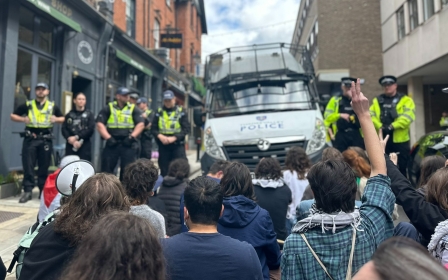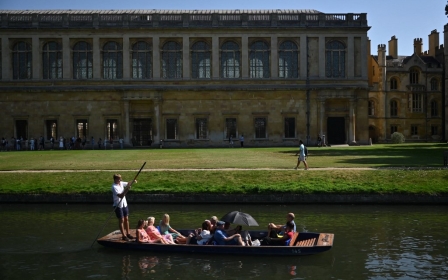UK: Anti-Zionist Jewish students ignored in 'antisemitic' NUS vote furore

In April, a Jewish student delegate at a National Union of Students (NUS) conference in Blackpool called for a non-binding vote on whether a pro-Israel body should be recognised as the legitimate representative of Jewish students.
The delegate saw the Union of Jewish Students (UJS), the NUS’s largest member body claiming to represent Jewish students, as excluding and marginalising Jews who are critical of Zionism. Several other Jewish attendees at the conference agreed.
But when the incident hit the headlines in a media furore in early May, their Jewish identity was unmentioned and unacknowledged.
“NUS delegates called for expulsion of main Jewish group”, read the headline in the Jewish Chronicle, which reported that the USJ was targeted because of its support for Israel.
Figures from the UK government soon weighed in. Lord Mann, the government’s adviser on antisemitism, expressed serious concern. “In the 1980s, extremists started banning Jewish societies,” he said. “We beat them. And today, we will beat the extremists again.
Stay informed with MEE's newsletters
Sign up to get the latest alerts, insights and analysis, starting with Turkey Unpacked
Education Secretary Gillian Keegan described it as a "disgraceful act". And Conservative MP Robert Halfon, who recently stepped down as the UK’s universities minister, said: “The question is whether or not NUS is institutionally antisemitic. It is up to them to prove otherwise. The treatment of UJS will be a seminal example.”
The NUS has apologised, saying that the motion was “outside of our guidelines and rules” and the issue of the UJS should only be discussed by Jewish students.
Both the NUS response and the media coverage disappointed the delegate and many Jewish students present at the vote.
“I find it profoundly offensive that the NUS apologised to Jewish students for allowing me, a Jewish student, to advance a motion regarding the way that Jews are structurally treated by the NUS," the delegate told MEE, speaking anonymously out of fear of repercussions.
Combatting anti-Israel rhetoric
The Union of Jewish Students describes itself as the “voice of Jewish students”, spanning “over 75 Jewish societies” at universities in the UK and Ireland.
One of the organisation’s official policies is to combat “anti-Israel rhetoric and anti-Zionism in the NUS”. Others are to “advocate for Israel within UK policy and international law”, to “combat the labelling of Israel as an apartheid state” and to back “Israel's right to defend itself”.
The UJS’s policies also include supporting a negotiated two-state solution and a “diverse, inclusive, and democratic Israel”, as well as opposing settler violence and combating anti-Palestinian racism.
An Al Jazeera documentary in 2017 revealed that the UJS had received funding from the Israeli embassy in London. In January, it supported and co-signed a public statement taking a “stand against anti-Zionist Jewish groups and their damage to our Jewish community”.
Edward Isaacs, the UJS president, attended a roundtable on antisemitism hosted by Prime Minister Rishi Sunak at Downing Street on 9 May.
The controversial vote in in Blackpool was introduced during deliberations on an ultimately successful motion calling on the NUS to show support for Palestine and a ceasefire in Gaza and back calls for universities to divest from arms companies.
According to the NUS, the student delegate proposed the vote as a non-binding “temperature check” on “whether or not NUS should engage with UJS as a legitimate voice of Jewish students”.
A Jewish student who was present at the NUS session told the Jewish Chronicle it “had an incredibly hostile atmosphere, especially when delegates began to vilify the UJS".
"The proposal to disaffiliate from it was backed by a vast show of hands in support, which in a room of non-Jewish students felt isolating and wrong,” the student said.
Diverse views
Several Jewish students present at the session described a different scene to Middle East Eye than the one portrayed in the Jewish Chronicle and were highly critical of its coverage.
The vote, they explained, was not to stop the NUS from engaging with the UJS but rather to assert that the UJS doesn’t represent all Jewish students.
One Jewish delegate, who attended the event and asked to remain anonymous, said they believed the incident shouldn’t have happened. “It’s not for a non-Jewish space to decide what does or does not represent Jews,” they said.
However, they added: “This doesn’t mean that there aren’t significant or legitimate critiques of UJS from Jewish students who are marginalised.”
Another Jewish delegate, who helped put forward the original motion on Palestine, agreed that the issue “should have been a matter for solely Jewish students” but attributed the unplanned vote to a misunderstanding on the part of the session’s facilitators rather than malice.
'It’s not for a non-Jewish space to decide what does or does not represent Jews'
- Jewish student delegate
The delegate stressed that the "temperature check" was only proposed because some Jewish students in the room didn’t feel "that UJS represents all Jewish voices".
The student who proposed the vote told MEE while they understood the discomfort around non-Jewish students voting on the issue, anti-Zionist Jewish students had told them they had experienced “exclusion and abuse” at UJS events.
“If the NUS truly believes that the issue of the UJS is one for Jewish students only to discuss, then the NUS will need to start deciding who counts as a Jew and who doesn’t,” they said.
Steve Jackson, a student officer at the University of Sussex Students’ Union, was “policy lead” for the Palestine motion, which he took to the NUS conference after months of discussions with around 50 student unions around the country. He said there is widespread scepticism towards the UJS within the NUS.
“When they turn up with private security guards, demonstrate hostility towards delegates and take any opportunity to undermine NUS’s democracy in the press, it’s hardly surprising,” he said.
Jackson, who is Jewish, defended the vote on the UJS, arguing that the organisation marginalises anti-Zionist Jews.
Since the UJS is the only associate member organisation of the NUS, he said, it is only fair that elected delegates have a say in its membership.
MEE has asked the National Union of Students and the Union of Jewish Students for comment.
Debates over antisemitism
Debates over anti-Zionism, antisemitism and Israeli abuses in Palestine have taken prominence in the NUS in recent years.
In early May, the NUS reached a settlement with its former president, Shaima Dallali, who was dismissed over allegations of antisemitism in November 2022.
Dallali, who has always rejected the accusations, filed a case with an employment tribunal claiming the student body had racially and religiously discriminated against her. She argued that she was targeted because of her support for the Palestinian cause and anti-Zionist views.
Both parties issued a joint statement published on the NUS website, in which the NUS conceded that holding pro-Palestinian and anti-Zionist views are “protected beliefs”.
An independent investigation stated in early 2023 that the NUS created an "unwelcome" and hostile environment for Jewish students. Jackson told MEE he believes antisemitism is a problem within the NUS and “everywhere across our deeply racist and fractured society”.
His grandfather - Maurice Jackubovie, who anglicised his name to Steven Maurice Jackson when he moved to the UK - was the only member of his family to have survived the Holocaust. “When I speak to Palestinian friends, I’m often struck by the similarities between not just our cultures, but the family history through which we or our parents came to the UK,” he said.
He feels that the UJS, with its pro-Israeli positions and its claim of legitimate representation, effectively denies the existence of many anti-Zionist Jewish students.
Another Jewish NUS delegate, Elise, told MEE that anti-Zionist Jewish students are “part of the rich tapestry of Jewish thought, resistance and experience”.
The Institute for Jewish Policy Research published a National Jewish Identity Survey in February 2024, in which it reported that 43 percent of British Jews in their twenties do not identify as Zionists, more than in other age groups.
Elise said there are many Jewish students who have “experienced hatred and invalidation from Zionists”. Two years after being elected the president of their university’s Jewish society, Elise was “called a stain on the Jewish people” and “the biggest threat to Jews” for expressing anti-Zionist views.
“Our Jewishness is only respected so long as we do not deviate from Zionist norms.”
Middle East Eye delivers independent and unrivalled coverage and analysis of the Middle East, North Africa and beyond. To learn more about republishing this content and the associated fees, please fill out this form. More about MEE can be found here.






